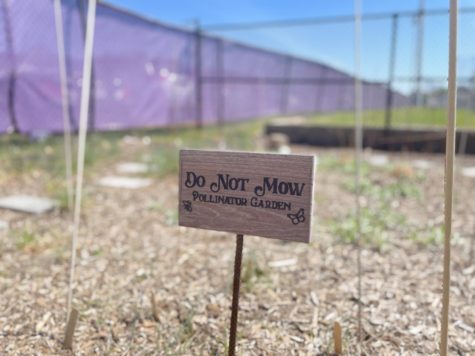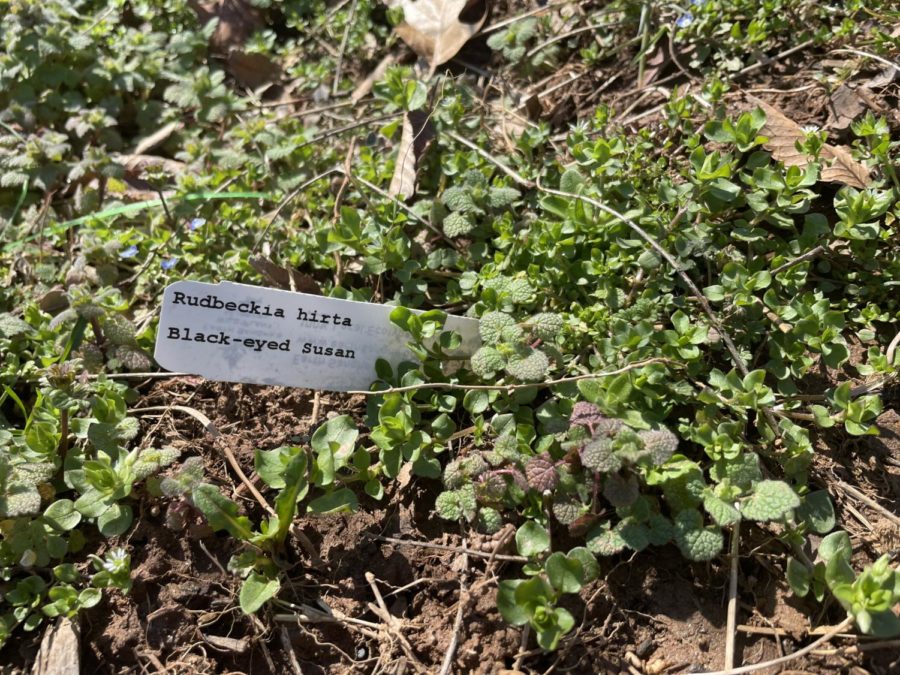Pollinator garden attracts native insects
The Black-eyed Susan, which is currently grown in the pollinator garden, is a plant native to North America. As different insects drink its nectar, it grows seeds that easily move with the wind.
April 28, 2022
Bees are buzzing, birds fly by and butterflies flap their wings. They all work to maintain the ecosystem and help all species prosper and diversify, especially with the help of a pollinator garden.
In the fall of 2021, science teacher Michele Gates created a pollinator garden located near the CHS baseball field. She wanted to teach students to be aware of the environment they live in and the contributions they can make toward it.
A pollinator garden takes native plants and attracts different pollinators such as bees, butterflies and birds to help increase the biodiversity of organisms and help the environment overall. In addition, there are a variety of flowers and vegetables within these gardens
Although the pollinator garden was created at the beginning of this school year, the idea started in 2019. Gates worked with her oceanography students to conduct many steps before growing each plant.

They first had to get the approval of the principal, Dr. Scott Poole, and after that, Gates applied for grants for the funding of the garden from Earth Sangha, a nonprofit public charity based in Washington D.C. Once they had received the grants, Gates and her students were able to start arranging for a plot of the land.
They moved fences in order to create a perimeter for the garden, and killed other plant species living in the garden so they could start planting the pollinator species. Once they completed this step, the group was able to start planting and working on the physical appeal of the garden.
“We spent multiple periods out there helping to build it, but Mrs. Gates did a majority of the work,” senior Shannon Herold said. “While out there, Mrs. Gates would tell us about which plants were native and which were invasive, as well as which were endangered.”
Through this process, students were able to learn how this garden affects the environment and how it will benefit them. With a stream nearby the school, Gates explains the importance of the garden within the surrounding waterways.
“If you’ve got a pollinator garden, you don’t need to use fertilizers and things like that, which go into our waterways and cause a process called eutrophication,” Gates said. “So the kids are seeing [that] what we do on land matters to our waterways and our oceans. It’s all interconnected.”
Eutrophication is a process when a body of water contains an abundant amount of nutrients, which causes the organisms living in the body of water to struggle or die due to the lack of oxygen the nutrients cause.
Through the garden, students can experience first-hand what affects the environment and help create a better ecosystem around the school.
“If we don’t pay attention to [the safety of our environment], then we’re going to continue to hurt our Earth, and it’s going to be bad for us,” Messier said. “[Students] can learn that it’s important not to litter, especially in the parking lot. We should just take better care of our school.”
The garden was also able to provide the school with certain accomplishments. The Bronze Award is awarded to schools that complete the required seven steps. They are: to create an eco-action team, conduct an environmental audit, create an eco-action plan, monitor and evaluate progress, link environmental topics to the curriculum, involve the community, and to create an eco code.
After receiving the bronze award from the National Wildlife Federation, Gates works towards becoming a Green Ribbon School. The Green Ribbon Award requires no specific application and the requirements include reducing the impacts and costs of the environment, improving the wellness of the school and its students and staff, and providing effective environmental education.
“One of our portrait of graduate skills is global and ethical citizens, [which is] making them aware of the planet that they live on and the contributions that they make, to both taking care of this [environment] and becoming more sustainable,” Gates said.
Students are able to visit the garden whenever they wish before or after the school day on their own time.
“[Students should] get out into nature and be a part of something bigger than themselves so that they can have an impact on their community and the planet they live on,” Gates said.



